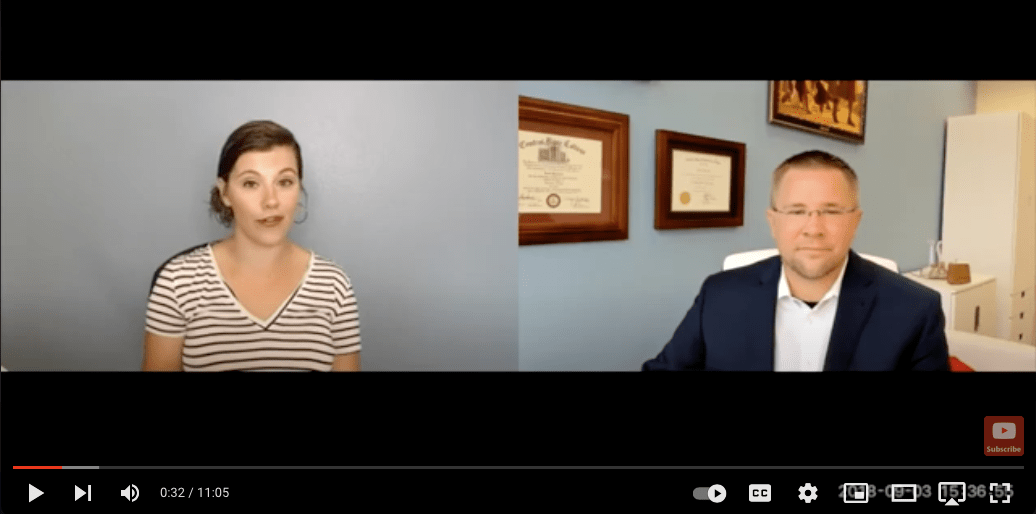Bipolar Disorder? How To Deal When My Brother Or Son Has It
This article is based on scientific evidence and clinical experience, written by a licensed professional and fact-checked by experts.
Posted: April 17, 2020
Estimated reading time: 4 minutes
In This article

“How to deal with a younger brother or a son having a disorder labelled as bipolar? How can we offer help to a 20 years old guy who is aware of his extreme mood swing, from mania to depression and vice versa (in biblical perspective/approaches)”
Cassie
Welcome to my counselor online. I’m Cassie, and this is asking for a friend.
Asking for a friend if you don’t know what that is, is a place where you submit your questions and I tracked down one of our awesome therapist and get your question answered. So today I have tracked down. Josh, and we are answering a question from an unknown friend and an unknown.
And my question is, How do I deal with a younger brother or son, having a label being labeled as bipolar. How can we offer help to a guide is around 20 who’s aware of his mood swings from mania to depression and what is a biblical approach or a perspective on this. So, Josh, take it away.
Josh
Yeah, good question and one that a lot of family members have those that have someone that they love that are struggling with something and they just don’t know how to be helpful to them. And so let’s let’s going to look at it from that angle.
One of the first characteristics that I note about it that makes the situation somewhat helpful.
Is that the person involved seems to have some acknowledgement of what’s going on with them. Right. That doesn’t necessarily from that question mean that they’re willing to seek help that they’re willing to address the issues that they’re facing and get help for those I would they do.
Have a admission to or an acknowledgement that it’s part of their experience and part of the struggle that they have. So we’re gonna really talk through two different scenarios and some of the underlying principles underneath those
And the first scenario is going to be the scenario where the person is open to getting help that they acknowledge that there’s an issue, and they are actively seeking routes for treating and address seen what they’ve got going on. Now both of these scenarios. There’s some principles of boundaries that apply.
The principles of boundaries would say this, it is easy when we love somebody To overstep our bounds that is that God has given us a limited autonomy or an unlimited sovereignty over our life. It’s not unlimited
And that, but he does give us both the responsibility and the ability to govern our lives, and he expects us to do so to exercise self control as a fruit of the Spirit. What he doesn’t ask us to do is control somebody else.
Even if that’s for their own good for their own benefit. And that’s where we get sometimes as Christians in this Harriet place that we love somebody, and we want to help them.
And so we overstepped the bounds of the limited sovereignty that God has given them over their life and instead of exercising self control. We try to exercise. Other control and try to get them to do what we believe would be best for them and their situation.
Part of navigating situations like this and unhealthy way our to have real clear understanding of what’s in my yard and what’s in their yard.
What is God made me responsible for what has God made them responsible for and to know where that line is and to stay in your own yard to stay in your own lane and even when that means The other person making choices that you wish they wouldn’t and it almost always does mean that at one stage or another.
But God hasn’t asked us to control the other person got could control the other person.
That’s created lots of things in creation that don’t have choice that are controlled by his design for them.
But God has chosen to allow people to make choices, even when they violate what he would desire for them, even to the extent of rejecting him as their got there’s their Creator.
And so if God’s and willing to control them, how we really don’t have the right or the authority to over cross those boundaries and for us to try to exercise control over them.
So we’ll need to allow them to make the choices that are part of their life and to be clear on what’s in their yard what’s in our yard and really to have clarity and our own walk with the Lord as to what he would have us do as it pertains this other person.
Because the Lord knows what’s really going to be a blessing to them and what’s not going to be a blessing to them and sometimes
In our attempts to be blessing tune individual, we can actually hinder things you know we we call that usually enabling
That is when we do things that just enable the bad behavior if the other person know enable them to not make the choices that they need to make in order to take care of themselves in a situation, we take response.
Cassie
So challenging to know what that is.
Josh
Absolutely. It’s these are not easy questions to navigate through and in the application of the principles to specific situations can be really challenging and difficult
But that’s, that’s just an abroad overarching principle that applies in all situations.
When we are in the situation or person is seeking help and is actively taking responsibility for their own life and making the choices. It’s a lot easier as a parent to come alongside them and support them encourage them to stay out of the role of trying to fix them In instead be in their corner be rooting for them, be a place for them to lean on and wait place for them to be able to be safe to share the difficulty of the struggle that they’re in.
To be a cooperative partner in whatever kinds of maybe therapeutic services or group services. group counseling, maybe that they’re engaging oftentimes as a counselor if I’m working with an individual that’s struggling through something like this.
And they have them having supportive people in their life is huge and then being able to reach their goals.
And so we’ll do an assessment of. Who are the people that they have in their life that are safe and that are supportive
And how can we use those relationships to help you reach your goals by being able to work on things outside of counseling with those individuals that then we’ll help you make it further towards your bills. So just make yourself available.
Respect their autonomy respect them as an adult and their right to make decisions, even if they’re not the ones that you would prefer that they would make
Us your yes and no judiciously to control the chaos in your life and to prevent resentment in your life.
Developing by saying yes to things that you probably should be saying no to that on on your side.
If you’re in the situation where you have an individual who’s doesn’t acknowledge you know their need for reaching out for help or is unwilling to take responsibility for that themselves the
The answer is it’s a tough situation and oftentimes there’s very limited amount of things that you can do.
Because God hasn’t given you the ability to make them make wise decisions for themselves. And so one of the principles that we would apply in a situation like that is
Be careful not to absorb the consequences of their foolish choices that if you absorb the consequences of their foolish choices.
Then you short circuit God’s pain process that motivates us to change direction and do things differently because of the pain that we’re experiencing.
If they make the choice, but you pay the consequence. And there’s no reason, or motivation for them to change direction.
So you want to evaluate our in the choices that I’m making short circuiting God structure and design for teaching us
And redirecting us from foolish behavior, and if so, how do I step out of that. So that would be painful to see them.
Experience things that we wish they wouldn’t have to. And that could be avoided that would understand that.
Then going through that as a process that they need to in order to get ultimately where it is they need to be to start taking care of themselves and making wise sessions and the situation.
Cassie
And start allowing that process. We shouldn’t sorry short circuit what he’s trying to do.
Josh
Right, right. God’s work. You know, there is a holy spirit and I’m not him, and you’re not him and trying to do his job in the life of others, never works out for you. Yeah. And so you’ve got to be able to step back from that and allow them to make their choices into
You know, have boundaries that place limits on the impact of their negative choices and I say limits because it doesn’t eliminate the impact of their choices, but it does minimize
The impact of the choices that they make and not put ourselves in a position of piling up present moment on our side.
So in in a nutshell. In a short little synopsis. Those are some of the important principles that come to play in a situation
Like this where you have a loved one who’s struggling with something and you were trying to figure out how do I support them come alongside them through that journey.
Cassie
Yeah, that was great and This friend is blessed to have a good friend like you that would look for a way to support him and be a help to him. If you have a question that you want to be answered by one of our counselors, submit it here!
Back to topThis article is based on scientific evidence and clinical experience, written by a licensed professional and fact-checked by experts.
About the Author

Josh Spurlock
Josh Spurlock MA, LPC, CST, has a BA in Biblical Languages and a Masters in Counseling. He is a Licensed Professional Counselor (LPC), holding licenses in Missouri, Colorado, and Florida. He is also a Certified Sex Therapist (CST), Level 2 AEDP Therapist, and an Ordained Minister. He is an Advanced Practice Clinician, with over 10,000 hours of clinical experience. He specializes in Marriage Counseling, Sex Therapy, Family Counseling, and works with Executives, Pastors, Business Owners, and Ministry Leaders. Learn more about Josh Spurlock at JoshSpurlock.com.
Josh is currently unable to take on any new clients.
Learn More About JoshShare this article
View more articles

How to Revitalize Connection in a “Roommate” Marriage: Pt. 2 Physical Connection
By: Danielle Schaefer







